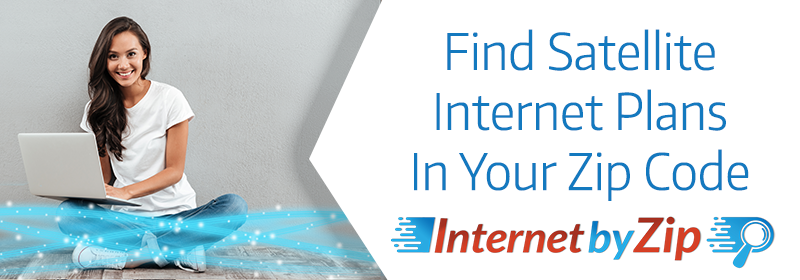
What is Satellite Internet?
Satellite internet is internet access that comes to your home from a communications satellite in orbit around the Earth. To send and recieved data to the satellite, your location would need a dish antenna and an indoor modem. Your dish antenna uploads and downloads data to the satellite, where the data signal gets amplified and redirected down to a dish antenna located at the satellite internet providers ground station communications hub connected to the backbone infrastructure of the internet.
With recent technology advancements enhancing satellite connection speeds, interest in providing satellite internet has increased with companies like OneWeb and SpaceX getting involved. In the next few years thousands of internet satellites are scheduled to be launched to help provide cost-effective, high-speed satellite internet to under-served areas throughout the world. As the need for high-speed internet access grows, it's highly likely more and more people will access the internet through a satellite internet connection than ever before. One of the pioneers in satellite communication is the Hughes Aircraft Company, founded in 1932 by Howard Hughes. HughesNet still provides broadband satellite internet today.
How Satellite Internet Works:
On the face of it, you get satellite internet via satellites up in the sky. More correctly satellite internet comes from a computer on a network (connected to the world wide web) then down some wires to a satellite antenna which then transmits the signal up to a satellite then down to a terrestrial satellite dish that translates the data which goes to your computer from the satellite modem. That is what happens when you download data. When you upload data, like maybe posting a picture to social media, it goes the other way; from your computer, through the satellite dish to the satellite then to the antenna at the satellite internet service providers location and then connects to the other computers on the internet. Most internet connections like cable or DSL come down wires the whole way from the network to your computer. Satellite signals travel most of the way through the air. You still need a modem in your home to connect to your computer. There will be a cable from the antenna to the modem and then either an ethernet cable or WiFi connection to your computer from the modem.
In a home internet use scenario, it would go something like this. A person sits at their computer and clicks to go to their favorite website. The computer sends that request through the satellite modem to the home mounted satellite dish antenna on the roof and up to the satellite up in space. The satellite is often in geosynchronous orbit around the Earth. That means that it stays in one position in relation to the Earth. The satellite system then forwards the request to the satellite internet service provider’s earth-based Gateway or Network Operations Center (NOC) which retrieves the requested website from the world wide web. The website data travels back through the NOC and up to the satellite, then back down to the internet users computer via the satellite dish on their house. All this happens in a matter of milliseconds.
How Fast is Satellite Internet?
Internet service via satellite offers consumer download speeds up to 100Mbps, and is often a great solution for people who live in rural areas or other locations without access to other forms of internet service. Satellite internet can be fast but it may still take a long time to download things after you first click the download button. There are two major factors affecting download and upload times: distance and speed. It doesn’t matter how fast the internet speed is if it is coming from far away. This is called network lag or latency. Satellite internet has longer lag than most other forms of internet access due to the massive amount of distance between the satellite and the dish antennas. Due to these issues, some internet activities are not optimum for satellite internet. Streaming music, online gaming, using a VPN and video conferencing do not produce optimum results using satellite internet due to high latency. The satellites that SpaceX and OneWeb are planning to launch will be much closer to the Earth than most of the existing internet satellites, which means they'll have less lag. This is called Low Earth Orbit or LEO. SpaceX’s constellation of satellites will be less than 1000 miles from Earth, in contrast to HughesNet satellites that are more than 20,000 miles from Earth.
Satellite Internet Download Speed Examples:
Quick Guide to Satellite Internet VS. Other Types of Internet Service:
Figuring out which service is faster, or "better" depends on the type of internet service being considered, as well as the company offering the service. Different companies offering the same type of service (Satellite, Mobile, Fixed Wireless, etc.) can vary wildly in speed and reliability. Keep this in mind when considering which internet service is best for your household as it's not just the technology type that's important when choosing which internet connection is right for you. This satellite internet versus comparison guide is based on the technology behind the type of internet service being compared, not individual providers offering satellite internet service.

Satellite Internet Pros & Cons:

Satellite Internet Pros
Satellite Internet Cons
Satellite Internet Service Requirements:
The biggest piece of equipment needed for satellite internet is your dish. This is usually placed outside your house on the roof, on the side of your house, or on a raised post or beam near the house. The dish antenna is installed in the location that best ensures a clear line of sight to the communications satellite. This will all be done by a trained professional during the installation of the satellite equipment. The satellite itself is typically in geostationary orbit around the earth so the dish needs to be pointed at the satellite all the time to pick up the signal. Internet satellites are most often orbiting the Earth over the equator so the satellite dish often will be facing south (if it is in the northern hemisphere). In order for a home to connect to the internet via satellite broadband, the line of sight to the satellite must be clear. Even though you may not be able to see the satellite yourself since it is high in the sky, there needs to be an unobstructed line for the signal to travel. Trees, mountains, buildings and even clouds and rain can hinder the signal.
